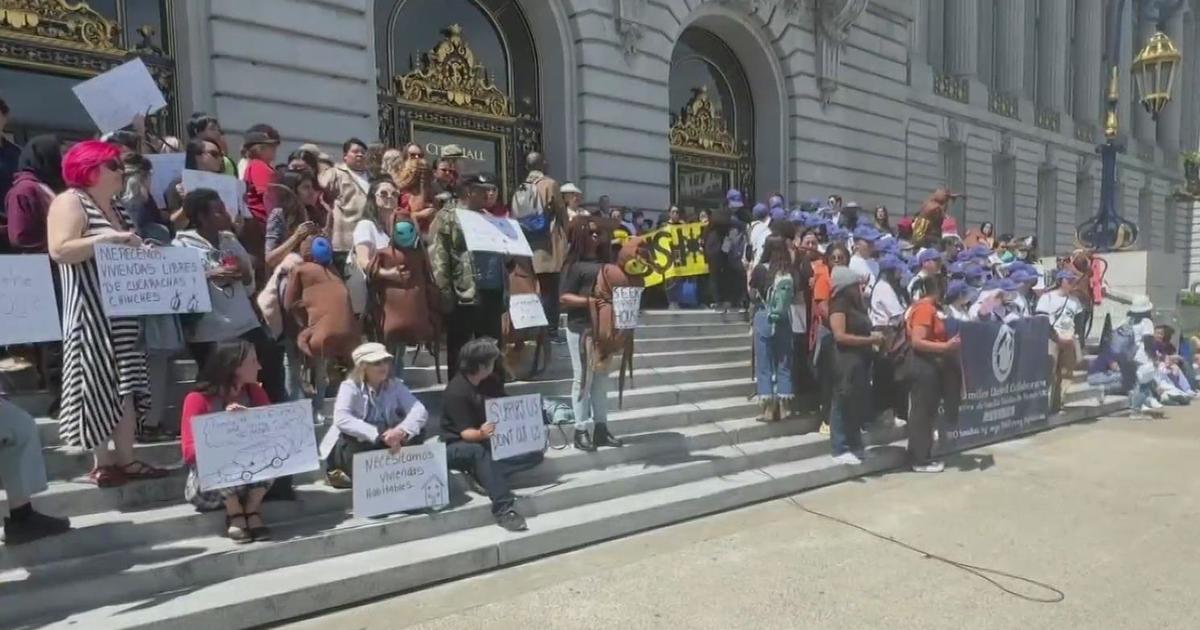Blind Bay Area Kayaker Floats Into Uncharted Waters
SAN FRANCISCO (KPIX) – Roughly 60 percent of blind people in the United States are unemployed. It's a statistic Ahmet Ustunel knows about as well as the cane he uses to navigate the local sidewalks.
But Ustunel is trying to empower the visually impaired, and he's using a kayak to help make an impact.
"In my life people have told me I couldn't do things," he reflected. "If I listened to them I wouldn't be here."
"Here" has many meanings for the 38-year-old Turkish immigrant. Where many visually impaired struggle to find their niche in the mainstream, Ustunel has adapted and flourished. He earned a graduate degree at San Francisco State and now has a career teaching the blind in public schools.
"Here" also represents the shores of San Francisco's Lake Merced, where Ustunel will launch his boat and cruise the water without assistance from another person.
Ustunel lost his vision at the age of three. His eyes fell victim to a rare form of cancer that he developed as a newborn. When his parents realized there was something wrong, it was too late to save his sight.
He is totally blind – no shadows, no shapes, no light. Only black.
It makes his walk to the pier seem precarious at best. He made a wrong turn, tripped over a curb, and drifted into the bushes. But he eventually got to his destination without any harm – such is life for a blind person.
Ustunel runs his cane along the edge of the wooden pier so he doesn't accidently make a splash. He looks more comfortable out over the water than he does with two feet planted on the shore. Looks, however, can be deceiving.
"In Turkey we have a saying: If you don't fear the water you don't know anything about it."
He grew up boating, swimming and fishing in the Black Sea, but found his passion for kayaking when a professor at SF State introduced him to the Environmental Traveling Companions, an organization that helps people with physical limitations get outside.
The experience helped Ustunel realize that kayaking did wonders for his four functioning senses.
"It's like being a turtle with a shell," he said. "You feel every moment of the water."
Ustunel owns an inflatable kayak that folds into bag on wheels. It takes him about 30 minutes to unpack the boat, blow it up with a hand pump, and carefully place it in the water.
He sprawls his gear all over the narrow dock, but is able to methodically set up the watercraft by memory and feel.
Even though Ustunel carries oars, he relies on a foot paddle to propel through the water. His hands are freed up to operate two speaking navigation devices – one of them on his iPhone.
"Anything can happen on the water," he said. "I don't go out without precautions."
The devices guarantee that Ustunel will be able to get back to the place he started, but the technology wasn't always this good.
Growing up in Turkey, he used to set a radio on shore and swim out until he could faintly hear the music. When the tunes began to get louder, he knew he was returning in the right direction.
The system wasn't fool proof.
"Somebody once thought I was wasting my batteries and turned off the radio," he said. "I told the guy, 'I don't care about the batteries, you almost killed me.'"
Ustunel has padded hundreds miles in all the Bay Area waterways, but it was the short three mile ride across the Bosphorus Strait of Istanbul that made him a legend.
The Bosphorus Strait connects Europe with Asia and is considered one of the busiest channels in the world. Approximately 48,000 ships pass through the strait each year which doesn't leave a lot of space for tiny kayaks.
"People told me I'd be like squirrel crossing the highway," Ustunel said of the massive tankers that barrel through the strait. "Even if they see you, they cannot stop."
Prior to the trip, Ustunel spent endless days cutting through red tape to get permission. But for a blind man, dealing with the Turkish government was only half his battle.
He received a $25,000 grant and enlisted the help of engineers at AT&T to design special sonar devices that detect traffic on the water.
It took over a year to prepare for a trip that lasted about 20 minutes. It was short, but also groundbreaking.
"When I reached my landing spot I could hear people cheering," he smiled. "That's it? It was that easy?"
He's known as the Blind Captain. It's an appropriate name for someone hoping to lead the visually impaired into uncharted territory. And as a teacher for the blind in public schools, the tide has already risen.
"Some of my students have asked me when we are going kayaking together," he said with a satisfied smile.
Ustunel's history-making ride across the Bosphorus Strait is just one of his many goals. He next hopes to make the 60 miles trip from Turkey to Cyprus, a Greek Island in the middle of the Mediterranean Sea.



